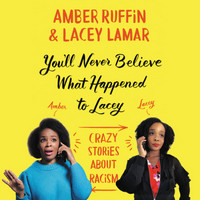 |
You’ll Never Believe What Happened to Lacey: Crazy Stories about Racismby Amber Ruffin, Lacey Lamar Unabridged Audiobook, 5 hrs., 21 min. Read: March 11-12, 2021 |

I’m going to lean on quotations from the book pretty heavily for this one, I feel awkward about trying to summarize this—and am afraid I’d come across as too flippant. Which, yeah, is an odd thing to fear for a book that can be rightly shelved under “Humor”
The Authors/Narrators
Amber Ruffin is the host of The Amber Ruffin Show, a writer for and performer on Late Night with Seth Meyers, and is consistently funny and thoughtful. Even when, especially when?, I disagree with her (which happens a lot). She’s the primary author (even when retelling something that happened to her sister) and narrator of the book.
Lacey Lamar is her older sister, who lives in Nebraska and works in the healthcare and human service field. She’s apparently a pretty big geek, too. While her contributions to the book/audiobook are briefer than Ruffin’s, when she pitches in, it’s well worth it.
What’s You’ll Never Believe What Happened to Lacey About?
Early on, we’re told
My sister Lacey is a lightning rod for hilarious racist stories, She’s the perfect mix of polite, beautiful, tiny, and Black that makes people think: I can say whatever I want to this woman. And I guess you can. Hey, knock yourself out—but that doesn’t mean you won’t end up in a book.
She’s such a lightning rod that
Twice a week, I get a text from my sister that says, “Can you talk?” It’s my favorite because I know I’m about to be transported to a place that exists in real life and fantasy: the place where coworkers will put their whole hand in your hair, talking ’bout “It’s fluffy like a dog.” I realize this sounds terrible, but it’s like watching Dateline. You can’t believe it was the GIRLFRIEND who killed the HUSBAND! It’s the edge of reality. Technically, it happens, but it is barely plausible. Excited, I steal away to the elevator banks at work and listen to Lacey tell me a new horror story. It’s fantastic. As I stand there, mouth agape, listening to some new fresh hell, I am always struck by the fact that these stories will only exist in this phone call. Some will go on to become stories once the topic turns to “racist people at work” one night when Lacey is hanging out with her friends, but she’ll forget most of them because of the sheer volume. The. Sheer. Volume.
That’s what this book is, a distillation of that volume. A compilation of the best/worst of those stories. They are tragic. They are sobering. They are frequently pretty funny. But only in the way they’re told. Lamar and Ruffin share these stories with an air of “you have to laugh or you’ll cry.” The kind of resigned laughter when you realize that your situation isn’t going to get better any time soon, so you might as well find the pleasure in it. A lot of this is hard to listen to/read—but it’s usually worth it. There’s also a decent level of “a spoonful of sugar helps the medicine go down” running throughout this.
Some of these stories are old, but a lot of them are post-Obama stories. A lot of folks think things like this don’t happen anymore. But in this climate where people are becoming more brave with their racism, I think things may get worse before they get better. Just kidding, I don’t think things are gonna get better. Just kidding about just kidding. I’m Team Hopeful! My point is: Has anyone ever decided to take a look at one person’s buttload of racist stories? What happens when you do? I don’t know, but here you go.
Audiobook vs. Text Version
So my wife read the hardcover and I read the audiobook (but was able to use the hardcover to grab some quotations). The hardcover features pictures and illustrations, and different typefaces for each author (a feature more books should use). Judging by her responses and just flipping through it, that seems like a great way to go through the book.
The audiobook is primarily read by Ruffin, with some assists by Lamar. Ruffin’s a great performer and the text comes alive with her reading. I think some of the comedy comes through stronger in the way they tell the stories—because a lot of these things are dark and my response leaned to horrified until I heard one/both of them chuckle about it. Also, listening to Ruffin describe the pictures you can’t see is likely as fun as seeing them. I’m not saying that the audiobook is better/worse than the text, but I can say you won’t regret it.
So, what did I think about You’ll Never Believe What Happened to Lacey?
Black readers will read these stories and feel that really good, yet terrible feeling of going through something bad and realizing you’re not alone, and not only that, but that someone else has it worse! And, hopefully, the white reader is gonna read this, feel sad, think a little about it, feel like an ally, come to a greater understanding of the DEPTH of this type of shit, and maybe walk away with a different point of view of what it’s like to be a Black American in the twenty-first century. Hence this book.
For me, I think they succeeded. I’m not a fool, I didn’t think we’d fixed racism or anything—but the casual and blatant racism Lamar encounters at work (or outside of work) is astounding. I can’t count how many times I stopped the recording to say something to my wife to marvel at how blatant the people in this book were. She’d ask where I was, nod, and ask “have you got to X yet?” “Um, no?” “Well, it gets worse…” And it did.
At the same time, I laughed a lot. Those two sensations shouldn’t fit so well together, but they do.
This is a comic-tragedy. A tragic-comedy. Either or both. you won’t soon forget this book. Entertaining and educational. Eye-opening. Frustrating. I strongly recommend this.

![]()




wittysarcasticbookclub
I moved to Florida from Utah. The neighborhood I live in has some of the most racist I’ve ever met. They’re pleasant to me (a little condescending, which I think is due to my gender) but they are AWFUL to anyone without pale skin. It’s been a sad education.